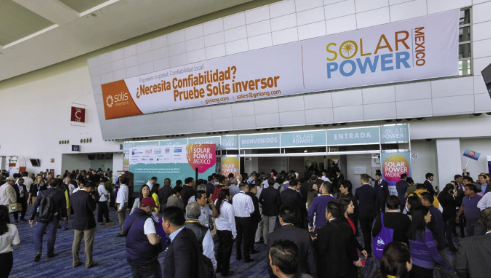Solar Power Mexico 2019 came at a time when the new government of Andrés Manuel López Obrador (AMLO) had just taken office, and uncertainty reigned when it came to energy policy. Almost a year later, though much more is known about government plans for the energy sector and the lacking favorable approach toward renewables, uncertainty is still present, especially for large-scale solar PV.
However, the ongoing context of the Mexican energy sector opens an unparalleled opportunity to surpass the success of the 2019 event, said Eduardo López, project director for the show organizer, Hannover Messe Mexico. “Faced with the global volatility of fossil fuels – not only in Mexico – communities worldwide are looking for the development of energy sustainability in order to create a fully diversified, modern, efficient and environmentally-friendly energy market, which in turn can evolve towards an innovative public policy that contributes to the economic and social development of humanity,” López told pv magazine.
The lack of visibility for a solar energy market in general and, in the specific case of Mexico, the government’s energy auctions for large-scale renewables, can provide stimulus for sector participants to attend trade fairs in search of unexplored market developments and, above all else, new or improved technologies.
“We expect more than 120 exhibitors and 5,000 attendees,” López stated. “We will also have 120 stands in 7,000m² of exhibition floorspace.” It is expected that 80% of enterprises will be foreign companies and 20% will be national companies. “We will also have the presence of global Chinese manufacturers of solar panels,” he added.
DG and storage
The 2020 exhibition also expects significant interest in the Mexican rooftop PV market. “The country offers huge investment and business opportunities in the installation of small and large-scale solar systems, because we are one of the five countries with the greatest solar potential, with annual daily irradiation levels ranging between 4.4 and 6.3 kWh/m²,” López said. The current favorable regulatory framework for distributed generation remained untouched by the AMLO administration. Additionally, lower module prices and the sector’s increasing ability to reduce costs are responsible for the market segment’s sustained and continuous growth.
The 2020 edition will bring focus onto energy storage, coninciding with the global trends that are creating demand for new storage technologies and options to integrate clean energy into the Mexican power system – which has been unable to expand much-needed grid capacity in recent years. “By raising consumer awareness toward energy efficiency coupled with shifting trends toward renewable energy utilization, we will enhance the energy storage systems market size,” López said. “We will have storage technologies from the United States, Canada and Europe that will exhibit their latest technologies in the sector, such as battery solutions for homes and high-performance batteries for large buildings.”
The conference will be stacked with a large number of workshops and panel sessions running parallel to the exhibition. These events will provide educational insights to the policies of federal, state and local governments toward renewable energy. Local best practices in the areas of social development, technology transfer, and energy storage will be covered. “We will host keynote speakers within the federal, state and local energy institutions such as the Ministry of Energy, the Energy Regulatory Commission, the Federal Electricity Commission and many others,” López said.
Not ‘expensive’
Solar Power Mexico 2020 has another important mission to accomplish. It needs to make it clear once and for all – both to the market itself and also to the broader Mexican public – that renewable energy is not “expensive,” as was recently stated once again by the head of the Mexican state-owned utility, Manuel Bartlett. In an address to the Mexican parliament, Bartlett said that clean energy is “too expensive” due to the need for backup. Ironically, on the same day in Dubai, state-owned utility DEWA received a minimum bid of $0.0169/kWh from Saudi Arabia’s ACWA Power in an auction for the contracting of 900 MW of photovoltaic capacity.
The price is well below the $0.02/kWh seen in the last auction in Mexico in November 2017, which at the time represented a world record low. Since then, even lower prices have emerged in auctions worldwide, including the first one in Portugal – which was held in the summer and had the lowest winning bid of €0.0147 ($0.017)/kWh – and the last one in Brazil, held in June, with a final average price of BRL 67.48 ($16.87)/MWh.
The integration of utility-scale renewables in a country’s energy system is not an easy task, as they are highly disruptive and undoubtedly force governments to reconsider long- and short-term strategies, while also pushing big energy companies and grid operators to rethink themselves and face new investments. But one thing is certain – renewables are cheap. And that provides great opportunity for Mexico to capitalize on its abundant resource.






